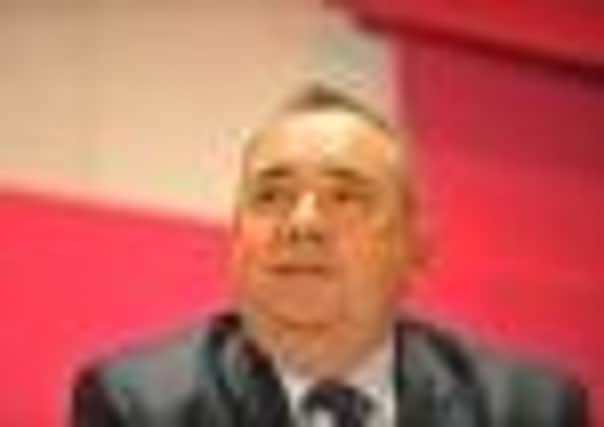Scottish independence: Alex Salmond admits BBC output would be cut


The First Minister made the admission as he outlined his proposals to transform broadcasting in Scotland at the Edinburgh International Television Festival last night. In front of an audience of media professionals and television producers, Mr Salmond was pressed on the content that would be provided by his vision of a new English-language public service broadcasting channel for Scotland.
Mr Salmond has said he would like to launch such a channel, which would have more Scottish content than currently provided by BBC Scotland and STV, plus the best of the BBC network.
Advertisement
Hide AdAdvertisement
Hide AdHe argued that Scottish licence fee payers currently brought in an income of £320 million a year, which compared favourably with BBC Scotland’s budget of about £100m. This meant there was enough money to buy in top-class content from the BBC and elsewhere.
But the First Minister was told English licence fee payers might object to some programmes, such as those broadcast on BBC4, being transmitted free in Scotland to terrestrial viewers, who did not pay extra to get them via satellite.
Mr Salmond said: “I am putting forward a position where there will be more opportunity, more availability to see more programmes, the best across a range of productions, a range of BBC content, as well as having the Scottish content that we don’t have at the present moment.”
However, he added: “I agree that there are some programmes broadcast on the BBC that you won’t see on terrestrial television in Scotland.
“There are a number of programmes that the BBC produces that the audience figures tell you are not of overwhelming demand. But there are programmes that the BBC produce which are of outstanding quality, and these programmes will be available.”
While the high-brow offerings of BBC4 may be at risk, Mr Salmond was keen to reassure people soap operas would be screened post-independence.
He went on to make what he described as his “Edinburgh declaration” when he told the audience that “EastEnders is safe” in an independent Scotland.
At the event at the Edinburgh International Conference Centre, Mr Salmond did not rule out the new Scottish channel raising money through on-screen advertising, although he added this would not be his preference.
Advertisement
Hide AdAdvertisement
Hide AdHe argued the “huge success” and unique content provided by Gaelic-language channel BBC Alba had shown a Scottish public service broadcaster would be a success. He pointed to viewing figures that showed it had an audience of 900,000, nine times the number of Gaelic speakers.
“Viewers are clearly voting with their remote controls for more Scottish content,” he said. “Yet we do not have an English-language public service broadcasting channel of our own.”
He pointed to Scotland’s long association with television, from its inventor, John Logie Baird, to the first BBC director general, Lord Reith, who did so much to define public service broadcasting. But the First Minister said Scottish viewers were being “short-changed”, because broadcasting policy was still controlled by Westminster.
However, his revelation that Scottish terrestrial viewers could lose out on some BBC content angered his opponents.
Shadow Scottish secretary Margaret Curran said: “Today, Alex Salmond told us that he’s going to break up the BBC, with no details about how he would do it or what it means for Scottish viewers or the people whose jobs rely on our TV industry.
“On Thursday night, millions of people tuned in to see the first episode of Waterloo Road, filmed in Greenock, broadcast across the UK. The question the First Minister needs to answer isn’t whether EastEnders will be available in an independent Scotland, it’s whether programmes like this will be made in Scotland, bringing jobs and growth to our economy.”
Ms Curran added: “Despite the weight of evidence that we’re better working together with the BBC, Alex Salmond still wants to break up the BBC. It’s about time that he concentrated on strengthening our creative industries rather than seeking to destabilise them.”
Scottish Conservative deputy leader Jackson Carlaw said: “This is another nonsensical outburst about how everything will be better in a separate Scotland – the only things missing, as usual, are the evidence and the detail.
“It will take more than a handful of historic references to convince the people of Scotland of yet another spurious claim.”